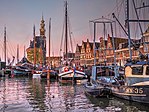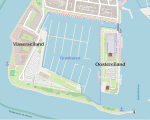Manifesto (music venue)
1999 establishments in the Netherlands20th-century architecture in the NetherlandsBuildings and structures in North HollandDutch building and structure stubsHoorn ... and 3 more
Music venue stubsMusic venues completed in 1999Music venues in the Netherlands

Manifesto is a music venue located at the Holenweg in Hoorn. The venue opened in 1999 and replaced the closed youth center Troll. The location has a total capacity of 350 people. The location has two different stages, namely the hall and the café. The hall has a capacity of 300 people and the café has a capacity of 50 people. Some noteworthy artists who have performed at this location are The Pretty Things, Mick Taylor, Russkaja, The Charm The Fury and Chef'Special. There are also often performances by local, regional and upcoming artists.
Excerpt from the Wikipedia article Manifesto (music venue) (License: CC BY-SA 3.0, Authors, Images).Manifesto (music venue)
Holenweg,
Geographical coordinates (GPS) Address Nearby Places Show on map
Geographical coordinates (GPS)
| Latitude | Longitude |
|---|---|
| N 52.650555555556 ° | E 5.0741666666667 ° |
Address
Holenweg
1624 PB (Hoorn)
North Holland, Netherlands
Open on Google Maps








